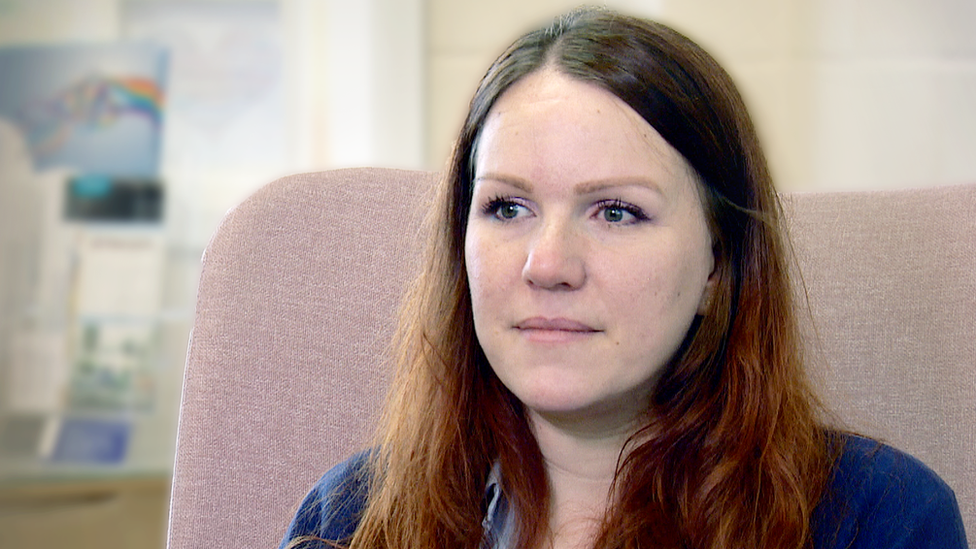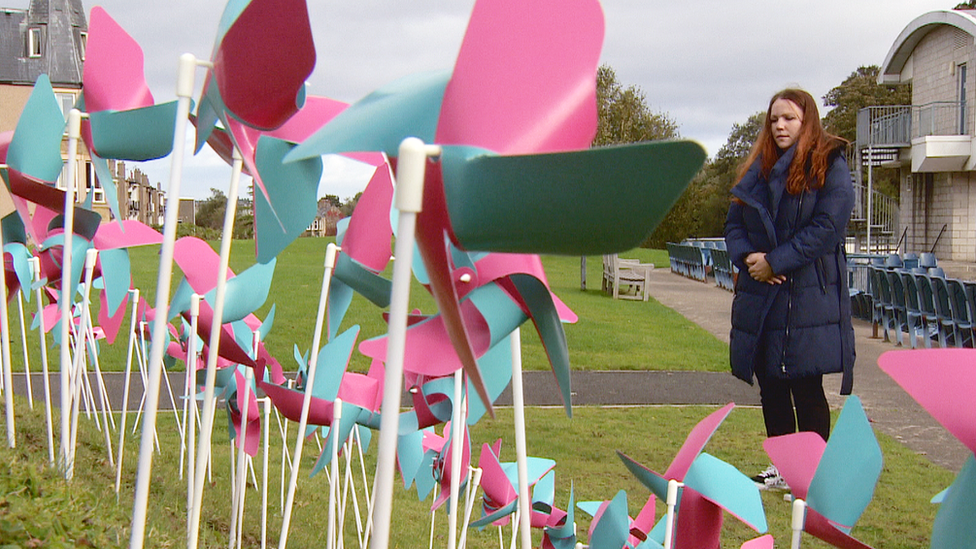Call for miscarriage leave as parents 'expected to go back to work'
- Published

Three months after losing twins in early pregnancy, the pain is still raw for Claire Dalles.
"We went from being told we were going from a couple to a family of four and within 21 weeks going back to just being the two of us," she said.
"It was devastating. I felt numb, like someone had put me in a boxing ring and knocked me out.
"It's your baby and it exists the minute you see on the pregnancy test that you are pregnant. It's the imagination, the fantasy of that life, what you will do, how much you will love that baby, what will become of it, how much your life will change and whether it is one week or 24 weeks the loss is just as horrible."
Claire is just one campaigner calling for paid leave for parents who lose a baby early in pregnancy.
Currently, parents who lose a baby after 24 weeks are entitled to bereavement leave, but those who lose a baby before are not.
The Scottish government offers three days paid leave for parents in the public sector who suffer miscarriage. But because the matter is devolved to Westminster, it can't be imposed on the private sector without UK government legislation.

Claire Dalles planted two windmills at a memorial garden in Edinburgh, where each represents a baby lost
Claire's story is heartbreaking.
"We found out we were expecting twins at an early stage because I had a pain in my right side. A scan showed that I was expecting two babies, which we were so happy about.
"When we went for the normal 12-week scan, one twin had disappeared. It's the vanishing twin syndrome. We were warned about it because apparently it happens quite a lot.
"I didn't physically feel anything. I don't know exactly when it happened, so for me it feels like it happened on the day of the 12-week scan because that's the day I found out.
"I was told my second twin was perfectly healthy, everything was fine."
'The only thing we could give him'
At her 20-week scan, Claire was given the devastating news that the remaining twin - a boy - had no kidneys, no bladder and no stomach. Claire also did not have enough amniotic fluid because the fluid is built up by the baby's urine.
She was told all of this was not compatible with life and was given the choice to continue with the pregnancy knowing that she would most likely lose the baby before term. If the baby was to be born, he would only live a few hours because his lungs would not be developed.
"My biggest concern was if my baby was feeling pain," said Claire. "We were told at this stage he was not feeling pain because the nervous system was not developed. So we decided to terminate the pregnancy while the baby was not feeling pain, because that was the only thing we could give our baby."
Claire lost both her babies within 21 weeks. She said that since the loss was classed as a miscarriage, she felt like her babies didn't matter and were not seen as real people.
Having to deal with her grief and be expected to work right away was difficult.
She said: "You already have a lot to deal with. You have your own pain, the pain of your partner and every single thing feels like a battle in those early days. If on top of that you have to worry about how you are going to be perceived or dealt with at work and battle against someone to get what should be yours to begin with, it is just horrible and adds to the pain and the struggle."
In Baby Loss Awareness week, external, SNP MP Angela Crawley has renewed her proposal that the UK government give affected parents the legal right to take three days paid leave.
The Lanark and Hamilton East MP's aim is to see the loss of a baby recognised at any stage of pregnancy and to increase the length of leave.
Starting point
She told the BBC: "I recognise that three days is often nowhere near enough to compensate or to allow parents time to grieve that loss. I would welcome seven or 14 days, akin to the current existing bereavement law.
"But, as a starting point, this private member's bill would be putting on the legislative or statutory footing the three days paid leave for those parents."
Nicola Welsh from baby loss support charity Held in our Hearts, external agrees something has to be done for those whose babies did not reach 24 weeks..
She said: "That could be someone who has lost a baby at 22 weeks and yet we are expecting them to go back to work, or have to go and get a sick line.
"That is just devastating, to think of somebody who has just had a labour and is still physically recovering and absolutely still emotionally recovering and they find themselves in a GP surgery where they are not sick, they're sad."

Stacey and Kevin Macdonald had different experiences with their employers when they lost a baby
Stacey Macdonald was lucky her company recognised her loss. Her employers "bent over backwards" to help her, guaranteeing two weeks protected leave after delivery.
It was not the same for her husband Kevin.
"Unfortunately, I was not in as privileged a situation with my work. it wasn't quite as smooth. I did get paid leave off but it was sick leave as there is no policy in place for baby bereavement."
Cross-party support is growing for the proposed legislation.
Ms Crawley's private members' bill is to have its first full debate in December.